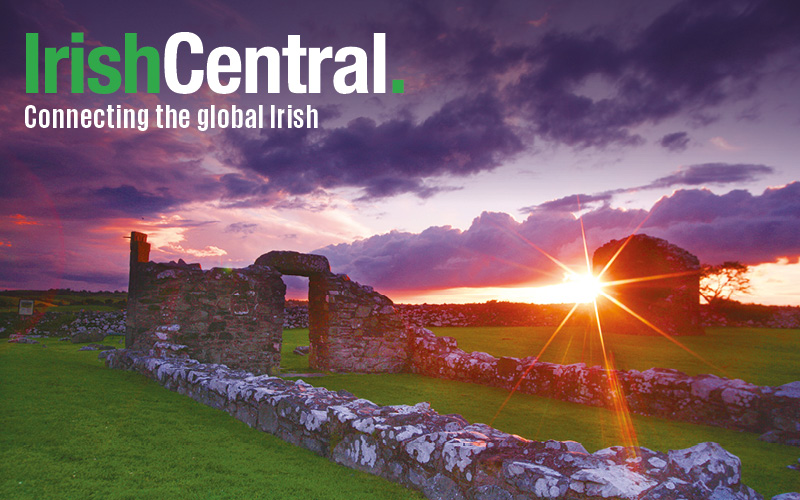Between her cookery school, her award winning books and her mission to remind the Irish how to cook healthy meals like their grandparents did, Darina Allen has become an Irish national treasure.
Call her one, though, and she flinches. “I think you have to be very old to be called that,” she tells the Irish Voice. “I’m 61 but in my head I’m still 18.”
These days some people call her the Julia Child of Ireland, but that doesn’t really do justice to her own achievements. Child revolutionized how many Americans cook, but Allen took the best of Irish cooking and gave it back to the world.
The experience has obviously agreed with her. She looks great, it has to be said. Full of energy and curiosity and sporting a light tan, when she appears in the foyer of the Standard Hotel in New York’s Meatpacking District she’s like a poster girl for the benefits of healthy living. Clearly there is something to be said for growing, preparing and cooking your own organic produce, because in person she’s glowing with health.
But it wasn’t roses all the way from day one. The true story of Darina Allen (“I’m an old hippy,” she says) is one of strong will and determination against, at times, quite sobering odds.
Today everyone knows about her cookery books, and her internationally famous cooking school at Ballymaloe, Co. Cork is in its 27th successful year, but her career got only really got started in the early eighties, during Ireland’s last major recession.
“When I was in hotel school I had no ambition to be anything,” she says. “Really all I wanted to do was to punch in the time until I could find a nice chap who would keep me in the sort of comfort I would like.
“I would just paint my nails and go on picnics and shop a bit. That was the height of my ambition. I never intended to be a career woman.”
But just look at her now. In conversation Allen speaks with the clear-as-a-bell locution of a well-to-do country girl, but she’s also friendly and funny and by no means a snob.
When she and her husband inherited a 100 acre farm in the seventies her dream of painting her nails and shopping ended, but it was replaced by something far more satisfying -- the opportunity to develop every one of her skills and found a career that has made her reputation internationally.
Allen was in New York during the St. Patrick’s period to promote her new award winning book titled Forgotten Skills of Cooking: The Time-Honored Ways Are the Best. Featuring over 700 recipes, it’s without doubt the greatest cookbook this reviewer has ever read because it’s filled with a lifetime of observations and cooking know-how.
“It wasn’t until I started traveling abroad that the penny really dropped about the quality of Irish food at home,” she says.
Last week the book won the prestigious Andre Simon Award in London (the Oscar of cookery books), competing against five other titles from a long list of almost a hundred entries. When the panel declared Allen the winner in a ceremony at the Goring Hotel, it was clear she’d traveled very far from her country beginnings.
“I was brought up in Cullahill in Co. Laois, which is really a tiny village, blink and you’ve missed it. I was the eldest of nine children. Growing up my mother was a really good cook and she also had her own garden. We had a Kerry cow, which meant fresh milk too,” Allen recalls.
It was a master class in the quality and flavor of Irish cooking. Allen’s father was the local merchant in the village, basically providing all the needs for the local village, being a shop, pub and post office all in one.
“He was the undertaker and the auctioneer too, and obviously very entrepreneurial,” she says.
Allen’s parents were pragmatic people, in other words, and they educated her in every aspect of Irish country life. “There was always cooking going on when you have nine children. By the time you’ve clean up one meal you were starting on another,” she says.
Allen speaks with obvious affection for her parents, remembering the country meals she used to help her mother cook as a child.
“Mummy made soda bread every day, and I learned various things just by helping to get the meal ready. As soon as I was able to reach the counter I started helping her. I began by making what we called a little kisteen (a child sized loaf). It would be hard as a rock, but everyone would say it was lovely just to encourage you,” she says.
Graduating from cooking school at the Dublin Institute of Technology in the late sixties, Allen entered the Irish job market at a time when there were only a handful of serious restaurants in Ireland, and all of them were staffed by male chefs. Did the experience of being denied a job in any major restaurant in Dublin rankle her?
“I wasn’t an absolutely rabid feminist. I came from a family where there was real respect for women. My father adored my mother, and I hadn’t come up against the stuff that made you a rabid feminist,” she says.
“But there was definitely a feeling that it was ridiculous. I wasn’t enough of a maverick to tackle that head on. I was just delighted to get the opportunity of finding the place I was looking for without having to go out with a poster.”
One of her tutors in Dublin told her about an extraordinary woman in Cork who had opened a restaurant in her own house on a farm in the middle of the country. At the time it was an unheard of idea.
Allen quickly found out that it was run by a woman was named Myrtle Allen, the celebrated Irish chef who is now her mother-in-law, as it happens. From the day Allen began cooking at Myrtle’s restaurant she was in her element. She even married Myrtle’s eldest son.
It wasn’t all tea and scones though. Several times she and her new husband almost lost it all -- their home, their car, and their way of life -- in the lean economic years when they were just starting up together.
Allen founded Ballymaloe cooking school in 1983 at the height of the Irish recession, and she watched as each year the number of participants grew and the project took on a life of it’s own. With Myrtle Allen’s help she had become a top class Irish chef with a formidable reputation herself, but now she was branching out and finding her own path (quite successfully, it turned out).
Like her mentor, Allen’s core philosophy is fresh and local, and go out to your garden and see what’s in season.
“You have to remember that all this stuff was revolutionary years ago. Myrtle had a simple point of view -- he said she cooked the food she knew how to cook. It was the sort of food that you’d be served in a country house that had its own kitchen and garden,” she says.
It was exactly the kind of lesson Allen was looking for. She soaked up the training that Myrtle (who had no formal training herself) provided. And even today at 86 her old mentor is still going strong. She’s still battling on behalf of small producers too.
“In the eighties I didn’t see any good reason why we couldn’t open a cookery school that was as good as any in the world, because we were located on an organic farm, with our own quality produce,” Allen says.
“So we opened the Ballymaloe International Cooking School in September 1983 and we had an American student for the first time who asked us, ‘Am I the I in your International Cooking School?’”
This year Ballymaloe had 56 students from all over the world. The school employs 50 people, and it has boosted the local economy quite a bit.
“Some of the students have even married into the local community,” says Allen approvingly. “When you realize that what you have at home is as good as anywhere, that’s how the journey begins.”
Forgotten Skills Of Cooking: The Time-Honored Ways Are the Best is published by Kyle Books, $40.




Comments